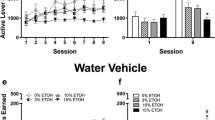Abstract.
Rationale: Ketoconazole, an inhibitor of corticosterone synthesis, has been reported to decrease the self-administration of low doses of cocaine and prevent stress-induced reinstatement of cocaine-reinforced behavior in rats. Objectives: The effects of ketoconazole were extended to the acquisition of i.v. cocaine self-administration during food restriction, a form of stress. Food restriction accelerates the acquisition of cocaine self-administration, and the purpose of this experiment was to determine whether ketoconazole would block the food-restriction effect. As control conditions, the effects of ketoconazole on the acquisition of cocaine self-administration in food-satiated rats and acquisition of food-reinforced responding were also evaluated. Methods: Six groups of rats (groups 1–6) were trained to self-administer i.v. cocaine (0.2 mg/kg; groups 1–4) or food pellets (45 mg; groups 5 and 6) under a fixed-ratio 1 (FR 1) schedule. Food availability was restricted to 20 g per day in groups 1, 2, 5, and 6, while groups 3 and 4 were fed ad libitum. Daily sessions included a 6-h autoshaping component followed by a 6-h self-administration component. During autoshaping, 10 infusions or food pellets were delivered each h under a random interval 15-s schedule after extension and retraction of a lever. During self-administration, the lever remained extended and infusions or food pellets were available under an FR 1 schedule. The criterion for acquisition was a 5-day period during which a mean of 100 cocaine infusions or 150 food pellets was obtained during the self-administration component. Rats were given 30 days to reach this criterion. They were pretreated with ketoconazole (25 mg/kg, i.p.; groups 1, 3, and 5) or vehicle (i.p.; groups 2, 4, and 6) 30 min prior to the autoshaping and self-administration components. Results: Pretreatment with ketoconazole decreased both the rate of acquisition of cocaine self-administration and the percentage of rats meeting the acquisition criterion but only under food-restricted conditions. Ketoconazole had no effect on the acquisition of food-reinforced responding. Conclusions: These results extend previous findings of the suppressant effects of ketoconazole on cocaine-reinforced responding in rats to the acquisition of cocaine self-administration using food restriction as a stressor.
Similar content being viewed by others
Author information
Authors and Affiliations
Additional information
Electronic Publication
Rights and permissions
About this article
Cite this article
Campbell, U., Carroll, M. Effects of ketoconazole on the acquisition of intravenous cocaine self-administration under different feeding conditions in rats. Psychopharmacology 154, 311–318 (2001). https://doi.org/10.1007/s002130000627
Received:
Accepted:
Issue Date:
DOI: https://doi.org/10.1007/s002130000627




